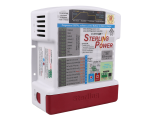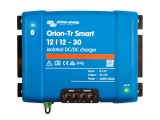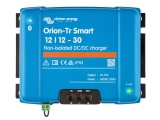Do I need a DC-DC Charger?4 November 2021 | Paul A question we get asked a lot is;"Do I need a DC-DC charger or can I use a split charge relay?"There can be a lot of confusion around this subject so we're going to try and break it down for you. What is a DC-DC charger and how does it work?A DC-DC charger is similar to a multi-stage mains battery charger, however, instead of a 240V AC input it requires a 12V (or in some cases 24V) DC input. This allows these units to be connected to a 12V power source such as the alternator of a vehicle. The charger will be activated as soon as the engine starts and uses either a hardwired connection or software to detect when the engine is running. DC-DC chargers can accept a range of input voltages (typically 10-15V for a nominal 12V system) and they either boost or reduce this to output the correct voltage charging profile for your battery. So a DC-DC charger's output voltage is independent of the input voltage and it can be configured to meet the charging requirements of any battery type. How do DC-DC chargers differ from Split Charge Relays (or Voltage Sensing Relays - VSRs)?A VSR is simply a switch and works by sensing a voltage and connecting or disconnecting two batteries when certain upper and lower voltage thresholds are reached. This is an inexpensive way of sharing charge from your alternator between your starter and leisure batteries but VSRs don't work well with variable voltage 'smart' alternators, found on Euro5/6 engines, because they switch off when the voltage drops below the 'disconnect' threshold (which can happen frequently throughout your journey). When this happens, your leisure battery isn't being charged. A DC-DC charger, on the other hand, can accept a range of input voltages so it stays active all the time the engine is on. It can also alter the charging voltage, meaning that your leisure battery will receive the best charge for its chemistry, regardless of what voltage the alternator is supplying. What are the benefits?You can charge any battery chemistry and not cause damage, which is especially important if upgrading your battery to lithium iron phosphate technology. The biggest benefit by far, however, has to be the more complete charge you will receive. As DC-DC chargers are multi-stage they can carry out absorption charging and get your battery charged to nearly 100% state of charge, compared with around 80% from a VSR. Which DC-DC Charger should I pick?The is the question we get asked most. All DC-DC chargers operate in fundamentally the same way, offering multi-stage charging and able to charge all battery types, so it really depends on your confidence with the installation, the specific features you want and the installation space available
DC-DC chargers all require some type of system to detect when the engine is running. This could be a signal from the alternator D+ connection, a switched ignition feed or software. By looking at the user manual you'll get an idea of how the unit will need to be wired up in your system and you can then decide how confident you are with the installation.
Each brand of charger will have different features and some may benefit you whilst others may not. It's worth comparing all the models to see if there are any specific features that you'd like, for example, some have Bluetooth connectivity, some have an optional physical remote control, some are ruggedised with a waterproof casing etc.
The size of the various DC-DC chargers available varies considerably, so you'll want to make sure you have space to mount the unit, including adequate space around it to allow for airflow and cooling. Take a look at the dimensions in the specifications and then identify a suitable installation location. If you are unable to make the unit you've selected fit, you'll need to look at alternative models or re-configure your build to accommodate it.
We hope you've found this section helpful, however, for more information on how to charge a leisure battery with a 'smart' alternator, see our knowledge centre article here, and for more details on split charging in general visit here.
|
|
12 Volt PlanetAuto & Marine Electrical Components |












